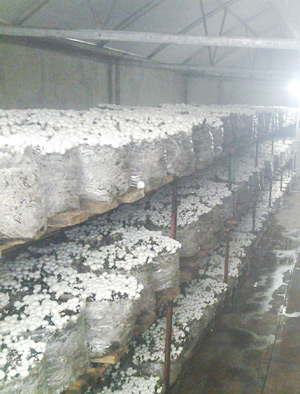
Agricon refuses protection

Not much room. One of Agricons growing rooms that will see them building more rooms so as to double current capacity in two years with an outlook to the African market.
Agricon Mushrooms is the only major production facility in the country that produces 3.5 tonnes of mushrooms per week on a 27ha farm while the growing room takes up approximately two hectares.
Jan Conradie from Agricon is of the opinion that it would be unnecessary to have their mushroom production under the Infant Industry Protection and said, “We would like to be preferred in the market due to our quality, consistency and client relations instead of being the only choice in the market due to higher import costs of South African products.”
Agricon started in 2010 with market research having begun years prior to producing White Buttons and Brown Mushrooms for the fresh produce market only and mostly to wholesalers that distribute to retailers countrywide.
Agricon is persuing specialized growing equipment to double the current capacity in a two year period with an outlook for export to the wider African market. While also expanding into different fresh produce products mostly imported from South Africa.
The outfit faces challenges such as having to source raw material from Europe. With the exchange rate playing a big role in production cost. Consistency in production is also a key factor that clients often overlook opting to go without mushrooms.
“Our mushrooms are preferred in the market because of our quality and freshness. Some of our clients will not import mushrooms if we do not have them that week,” he said.
Conradie said every small seasonal, environmental or implemented change has a big effect on the production, whether positive or negative.
Mushroom researcher with the Ministry of Agriculture, Water and Forestry Lydia Horn is of the opinion that environmental conditions play a major role in the failure of mushroom projects. Poor infrastructure such as unsuitable mushroom fruiting houses does not provide a conducive environment for mushroom growth.
Fidelis Mwazi, National Horticulture Manager at The Agronomic Board Market Share Promotion (MSP) facilitates demand for local production of horticulture fresh produce in Namibia listed mushrooms as on of the top crops that are currently contributing to the basket for retailers who comply with the MSP.
“In 2012/ 2013 reporting period, 31,927 tonnes of fresh produce were imported, reducing our dependence to 12,455 tonnes of imported produce. “This shows that we are capable of increasing the production of our own fresh produce and we can rely to a lesser extent on importing from outside of Namibia on the commodities that we can grow ourselves,” Mwazi said in a statement.
Meanwhile the Directorate of Agricultural Research and Training in the Ministry of Agriculture offers week long training in mushroom cultivation to a minimum group of five participants.












































